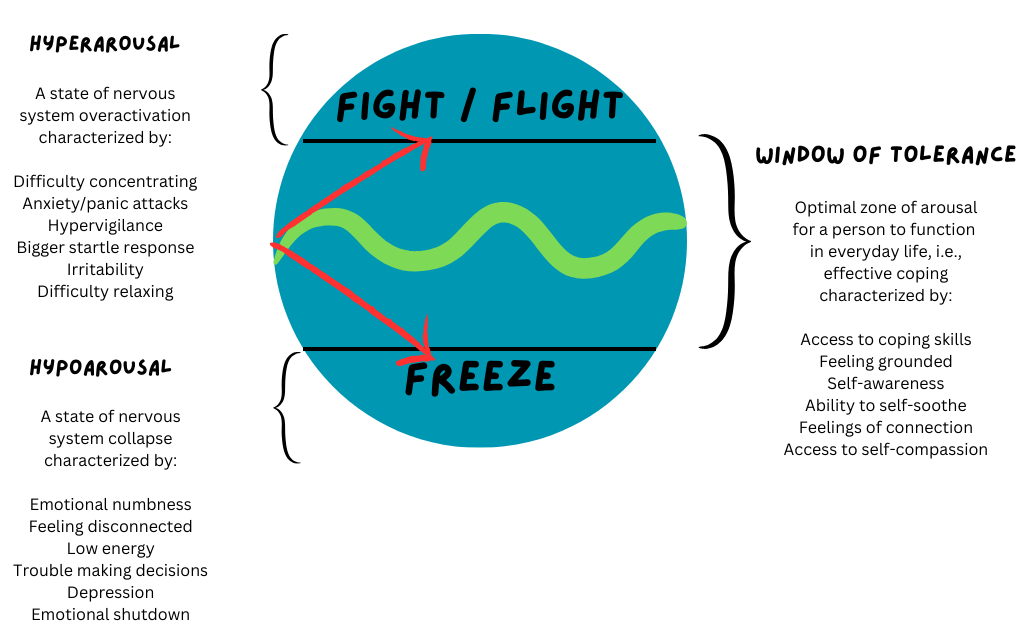Navigating Trauma with Compassion
Finding Safety in Vulnerability
So much of the safety that is integral in therapy, especially for those of us with trauma histories, lives in the complex balance of security in the present moment and entering into vulnerability (painful emotion). Knowing this, it’s important to develop coping and grounding skills for withstanding the pain. At times, skill development feels frustrating (I know I have, on a number of occasions, balked at having to develop skills to cope with pain I did not ask for).
Strengthening Coping Strategies
Widening the Window of Tolerance
Practical Applications
Everyday Examples of Staying Within the Window
Remaining inside your window of tolerance doesn’t mean you don’t experience emotions. It means we minimize the distress that occurs when a painful emotion is present. Essentially, existing within that window means you can experience sadness, fear, or anger without triggering a survival (fight/flight/freeze) response. If you have ever become frustrated with a distracted driver while maintaining your ability to focus on the road, become upset with a partner and took space away to process emotions before resolving conflict, or made a mistake on a project and were able to reframe negative thoughts about yourself – You have remained within your window.
Reflections on Progress
Becoming a Harbor of Safety
Progress in therapy does not mean something isn’t sad or scary over time. It means you become your own harbor of safety and remain compassionate and present with yourself as you heal. Safety is not always necessarily the absence of danger; safety is your ability to connect with yourself, your support system, or your coping skills when danger is present.
The Balance of Safety and Vulnerability in Therapy
In therapy, especially for those with trauma histories, safety is a delicate balance between feeling secure in the present moment and being open to vulnerability. This balance is crucial for healing and growth.
Developing Coping and Grounding Skills
Developing coping and grounding skills is essential for managing painful emotions. Although it can be frustrating to build these skills, they are vital for maintaining a sense of safety and stability during therapy.
Expanding the Window of Tolerance
When your therapist helps you ground yourself, develop coping skills, and stay present, they are helping you expand your Window of Tolerance. This allows you to experience emotions without triggering a survival response, enabling you to process and heal more effectively.

Anxiety and Stress: How Does Our Body React?
Have you ever wondered what's happening in your body when anxiety and stress are triggered? Stress and Anxiety are "fight or flight" responses, which allow us to react faster and more appropriately, depending on the situation. These have been incorporated in us...

Anxiety: Your Friend?
Anxiety and panic attacks are uncomfortable. Sometimes anxiety is so physically uncomfortable that people experience heart palpitations, nausea, chest pain, dizziness, difficulty breathing, or faintness. Sometimes anxiety symptoms worry someone so much that they call...

All about EMDR as Trauma Therapy
Have you heard of EMDR? Among therapists, it’s all the rage as an up-and-coming, evidenced based approach for trauma treatment. Because it is different than standard talk therapy, we thought you might have some questions. We’d love to help demystify EMDR as a form of...

5 Steps to Coping with Panic Attacks
Unless you are face-to-face with a bear or another physical danger, nothing feels more terrifying than a panic attack. Many have gone to the Emergency Room fearing heart attacks, strokes, and death. With symptoms including chest tightening, throat constricting, and...


